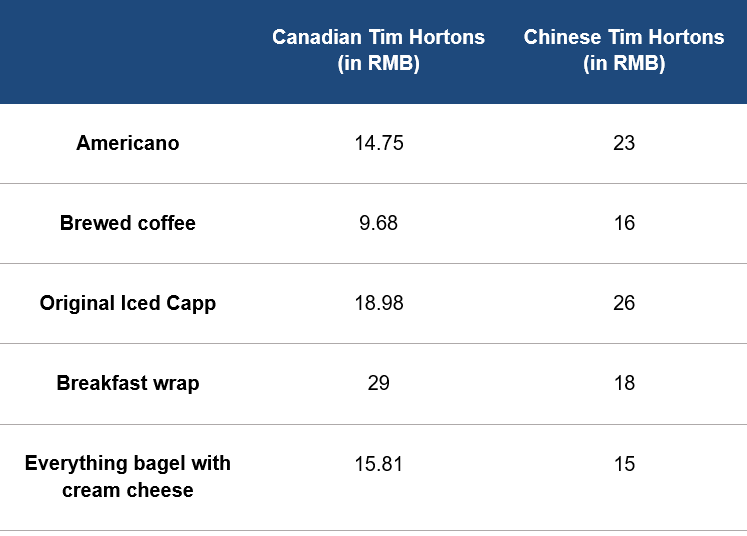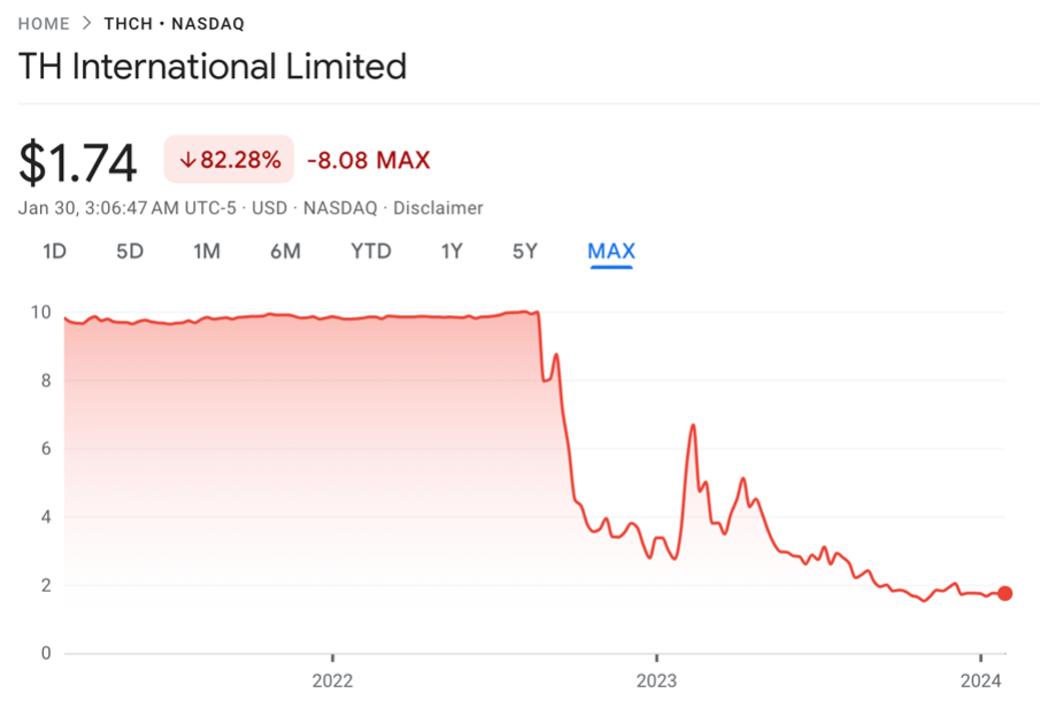Tim Hortons China (天好), the largest franchisee of Tim Hortons globally, holds the exclusive franchise rights for Tim Hortons in mainland China, Hong Kong, and Macau. Since the opening of its first coffee shop in Shanghai in 2019, the brand has experienced rapid expansion. The brand has over 800 stores as of the beginning of 2024 and a target of 2,750 stores by 2026. Tim Hortons China has successfully entered over 56 cities, each boasting a population of more than one million residents.
Download our report on Gen Z consumers

Tim Hortons China: a premium experience with Canadian ambiance and localized snacks
Tim Hortons China provides a premium coffee experience infused with Canadian heritage
Distinguishing itself from its Canadian counterpart, Tim Hortons China adopts a refined positioning. The Chinese counterpart set its coffee prices higher than the more fast-food-oriented setting in Canada. However, it is worth noting that the food items in China are the same price, if not cheaper than in Canada. This distinction arises from Tim Hortons China’s practice of importing roasted coffee from Canada, while the food offerings primarily come from local sources, aligning with the region-specific menu.

The modern ambiance of the brand further accentuates this distinction, featuring decor elements that exude “Canadian-ness,” including a beaver mascot, hockey sticks that work as door handles, and employees wearing red and black lumberjack shirts. This underlines Tim Hortons’ commitment to standing out and emphasizing its unique Canadian heritage in a market with strong competitors like Luckin Coffee and Starbucks.

Salted egg yolk Timbits: Tim Hortons localizes its iconic classic
Moreover, a notable contrast in product offerings exists between Tim Hortons in China and Canada. In China, there is a deliberate shift with less emphasis on donuts, and the pastries are less sweet than in Canada to appeal to local tastes. Even the iconic Timbits are offered in distinctive flavors like salted egg yolk and oolong tea. The sandwiches also have fillings adapted to Chinese preferences like prawns and black pepper, unlike the typical BLT or grilled chicken available in Canada.
Tim Hortons China ventures beyond sit-down stores
Tim Hortons China ventures into convenience coffee with Tims Express
In a recent move toward diversification, Tim Hortons China introduced the innovative Tims Express concept, featuring compact, take-away-only stores with a footprint of around 20 square meters. These compact units are strategically designed to be installed within existing retail premises. The Tims Express initiative has proven successful, contributing to a notable 27% like-for-like sales growth in June 2023. These smaller stores have found homes in diverse locations, including Century 21 offices, Haier stores, hotel lobbies, Bestore outlets, and selected Easy Joy stores—China’s largest convenience store chain. From its launch in 2022 to 2024, the Tims Express network has expanded significantly, now constituting over 15% of Tim Hortons China’s overall footprint. Starting in the second quarter of 2022, the company also introduced co-branded ready-to-drink coffees in collaboration with Easy Joy convenience stores.
Compact stores in metro stations blend convenience with commuter aesthetics
By the end of 2023, Tim Hortons China expanded its Tims Express concept by launching seven small-format stores within Shanghai Metro stations. These compact Shanghai Metro locations incorporate design elements inspired by the Metro network’s train carriages, façades, and lighting. This strategic initiative is anticipated to significantly boost foot traffic, considering that approximately 10 million passengers use the transit system on an average workday.
Tim Hortons China’s innovative moves in partnership with tech giants
Esports cafés and strategic collaboration with Tencent for Gen Z appeal
To strengthen its presence, Tim Hortons China formed strategic partnerships with Chinese tech giants. Collaborating with Tencent in 2020, the brand opened esports cafés in Shanghai and Shenzhen to appeal to Gen Z consumers. These coffee shops showcase drinks and food inspired by esports themes, along with gaming chairs, trophies, and TV screens. In 2022, the Vice President of Tencent Games stated that they observed favorable outcomes arising from the implementation of this new business model. Tencent also contributed to Tim Hortons’ expansion in China by making an undisclosed financial investment in the company in 2020.

Co-branded products and joint expansion efforts with Alibaba’s Freshippo
At the end of 2022, Tim Hortons China entered a two-year partnership with Alibaba’s grocery chain, Freshippo (盒马鲜生). This collaboration involved the sale of co-branded products both online and offline, including items like Velvet Cocoa Coffee and Chestnut Latte. Beyond coffee offerings, Tim Hortons China and Freshippo committed to joint efforts in research and development, collaborative product design, and coordination in positioning, promotion, and pricing. This strategic alliance aims to expand Tim Hortons’ presence in tier one and tier two cities where Freshippo has a significant operational footprint.
Partnering with DiDi Chuxing for brand-building triumph and customer engagement
In a bid to bolster its presence, Tim Hortons China strategically partnered with ride-hailing company DiDi Chuxing (滴滴出行) in December 2023. As part of this brand-building initiative, users of the DiDi app were incentivized with points for a complimentary Tims bagel or coffee for each ride booked between November 27 and December 10, 2023. To broaden their collaboration, the brand has unveiled DiDi-themed stores in prominent Chinese cities, including Guangzhou, Wuhan, Beijing, Shanghai, and Chengdu. The campaign yielded impressive results, including the acquisition of 20,000 new loyalty club members and an additional RMB 1.7 million in sales for Tim Hortons.
Tim Hortons China’s green initiative: unveiling the first eco-friendly store in Shenzhen
Tim Hortons China marked a milestone in the summer of 2023 by unveiling its inaugural eco-friendly store, showcasing a commitment to sustainable practices. The exterior of the store features planters made from recycled coffee grounds, creating a visually appealing and environmentally conscious landscape. Inside, decorative maple leaves are made from coffee grounds. The store further embraces sustainability by introducing eco-friendly straws also made from coffee grounds, demonstrating Tim Hortons’ approach to a circular economy.
Challenges and losses: Tim Hortons China’s parent company faces sustained investor concerns
A reflection on Q4 2022 challenges due to COVID-19 impact
Despite its innovative initiatives and partnerships, TH International Limited, the parent company of Tim Hortons China, has faced decreased investor confidence. Its NASDAQ stock price fell from USD 9.99 on August 26, 2022, to USD 2.75 on January 27, 2023. The Q4 2022 quarterly report attributes the challenges to the COVID-19 pandemic. The dramatic decline in stock price coincides with renewed lockdowns in major cities like Guangzhou and Shenzhen.
Tim Hortons China’s aggressive expansion leads to significant operating losses
TH International’s 2022 annual report also sheds light on the increasingly high operating losses of the company, which surpassed RMB 141 million in 2020 but reached RMB 581 million in 2022. These losses are driven by the aggressive expansion of Tim Hortons in China. In February 2023, the company’s stock saw a temporary increase after announcing a licensing deal with Popeyes in February 2023 but continued on a downward trajectory, with the stock price reaching USD 1.74 on January 26, 2024.

What we can learn about Tim Hortons’ journey from Canada to China:
- Tim Hortons China, the largest franchisee globally, holds exclusive rights in mainland China, Hong Kong, and Macau, with over 800 stores in 2024.
- It distinguishes itself with a premium coffee experience and Canadian ambiance, featuring unique decor and elevated positioning.
- Product adaptations for local tastes, such as less sweet pastries and unique Timbit flavors showcase a deliberate shift in offerings.
- Tim Hortons in China diversified with Tims Express, small-format stores contributing to a 27% sales growth.
- Strategic partnerships with giants like Tencent, Alibaba, and Didi Chuxing boosted brand presence and customer engagement.
- Their eco-friendly store initiative in Shenzhen demonstrates Tim Hortons’ commitment to sustainability, including recycled coffee ground planters and straws.





